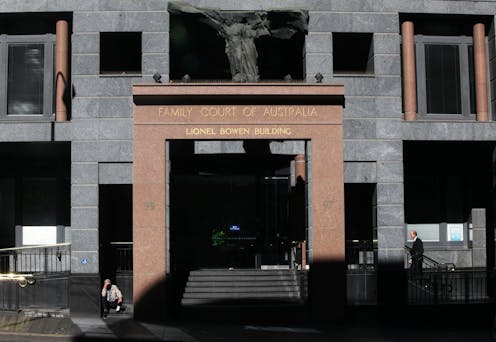Source: The Conversation (Au and NZ) – By Camilla Nelson, EG Whitlam Research Fellow at the Whitlam Institute, and Associate Professor, University of Notre Dame Australia

April Fonti/AAP
There is much to be excited about in Attorney-General Mark Dreyfus’s draft Family Law Amendment Bill 2023, the first in a projected series of reforms that promise to put children’s needs and interests back at the centre of family law.
But the proposed reforms stop short of the radical change that is required.
To change the culture of the court, children need legal rights – not just a rubbery set of “best interests”. And the court must be responsible for ensuring children’s rights are protected.
A central problem is that the adversarial culture of the court marginalises children, and can profoundly silence them, including when children express concerns about their safety.
On the upside, the proposed legislation will require the Federal Circuit and Family Court, and Family Court of Western Australia, to more adequately prioritise children’s safety concerns than it has done in the past.
Read more:
Book extract: ‘Broken’ — requiem for the family court
Ending the presumption of ‘shared parental responsibility’
It abandons the presumption of “shared parental responsibility”, which has been widely misunderstood to mean shared care. This may be an achievable goal for families that do not need to go to court to make safe arrangements for their children’s care, but is unsuitable if not dangerous for families with the complex needs and risk factors that come before the court. This includes domestic abuse and family violence, child sexual abuse, drug and alcohol addiction, and serious mental health concerns.
Instead, the bill proposes that the child should be at the centre of every legal determination.
Significantly, the child’s views will be given greater prominence in the legislation, rather than being treated as optional extras.
Independent children’s lawyers – whose role is to ensure evidence relevant to the child’s “best interests” is put before the court – will also find it more difficult to circumvent the requirement to actually speak to the children whose “best interests” they are meant to represent.

Cassiano Psomas/Unsplash
Giving children a voice
The fact that children’s safety and views have not been the guiding principles in family law for almost two decades ought to be a matter of public shame.
In 2023, Australian children have fewer rights under the Family Law Act than they did in 1975, when it was first enacted by the Whitlam government.
This devaluing of children’s rights has contributed to the courts’ failure to adequately recognise the autonomy of older children. This includes the right of young people to make age-appropriate decisions about their lives, such as what subjects they will study, where they will live, and who they will see.
In some instances, young people have been subjected to unnecessarily traumatic and expensive litigation. One such example is a trial – the second of two final hearings – that sought to determine whether a young man a few months shy of 18 was permitted to accept a hockey scholarship.
The dangers that attend highly adversarial family court proceedings have been raised in evidence in successive inquests into child deaths, such as the murders of Jack and Jennifer Edwards by their father, the murders of Jane and Jessica Cuzens by their mother, and the murders of Darcey Freeman, Eeva Dorendahl, Jessica and Patrick Dalton, and Luke Batty, by their fathers.
Under court orders, children are routinely forced against their will into supervised (and unsupervised) contact arrangements with alleged perpetrators of domestic violence and child sexual abuse – including cases in which abuse has been deemed likely, probable, or even proven.
The court should not be exempt from obligations under the National Principles for Child Safe Organisations, an outcome of the Royal Commission into Institutional Responses to Child Sexual Abuse. It should also be required to conform to Australia’s human rights obligations, as a signatory to the UN Convention on the Rights of the Child.
Read more:
Are you and your partner thinking of separating? Here’s how to protect the kids’ mental health
The proposed changes
The draft Family Law Amendment Bill gives effect to key recommendations in the Australian Law Reform Commission’s 2019 review of the family law system. These changes were shamefully stalled by the former Morrison government.
The proposed legislation will require family report writers and Chapter 15 experts – who tender evidence and provide services to the court – to at long last be regulated for standards and quality.
The court’s failure to adequately regulate these standards has led to glaring injustices, such as the infamous case in which an accused paedophile was used as a court expert to provide advice on allegations of child sexual abuse.

Lukas Coch/AAP
The bill makes some attempt to address litigation abuse, a widely documented phenomenon in which a perpetrator seeks to weaponise the legal system – sometimes launching multiple actions across a variety of legal jurisdictions – in order to intimidate, harm, inflict financial damage, threaten and harass a victim. The court will be given more power to throw out such cases than it has at present.
There are also changes designed to better protect sensitive information, to safeguard against situations in which perpetrators use subpoenas to gain access to a victim’s medical or therapeutic records in order to inflict harm.
Many parts of the bill seek to clarify existing arrangements, such as setting out the circumstances in which a parenting order can be changed.
This may have some impact on litigation abuse, but it is unlikely to assist victims who have agreed to unsafe children’s arrangements out of fear, or a lack of financial resources. It also does not help, for example, a self-represented litigant whose English-language skills are not at the level that a fast-paced adversarial legal action requires.
A recent report commissioned from Australian Institute of Family Studies demonstrates that contraventions of court orders often occur because children and young people are not given age-appropriate opportunities to participate in decision-making that directly affects their lives. The report also found a significant number of children subject to court orders are living in unsafe arrangements.
Reining in those who profit
Another glaring omission is the need to more strongly regulate the activities of the private legal profession, including obscene profiteering.
The bill addresses some unintended consequences of privacy provisions contained in the act. But it does not allow adults whose parents went to court when they were children to openly talk about the ways in which the court’s decisions impacted their lives.
Privacy provision should not be used to conceal injustice or silence victims.
Children do not suddenly transform from dependence to autonomy on reaching the age 18. It is by making age-appropriate decisions about their lives that young people work out how to live and – ultimately – what sort of citizen they would like to be.
In 1975, the Whitlam government accepted that a young person at 14 had a right to actively make decisions about their lives, unless there were compelling reasons for a court to intervene.
It’s time to go back to the future – and put children’s safety and rights at the centre of family law.
Camilla Nelson is co-author of Broken: Children, Parents and Family Courts, Black Inc/La Trobe University Press.
![]()
Camilla Nelson has received funding from the Whitlam Institute within Western Sydney University.
– ref. Labor’s proposed family law overhaul makes some important changes, but omits others – https://theconversation.com/labors-proposed-family-law-overhaul-makes-some-important-changes-but-omits-others-198773






